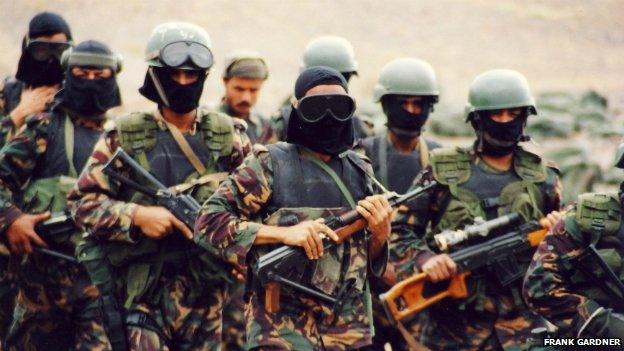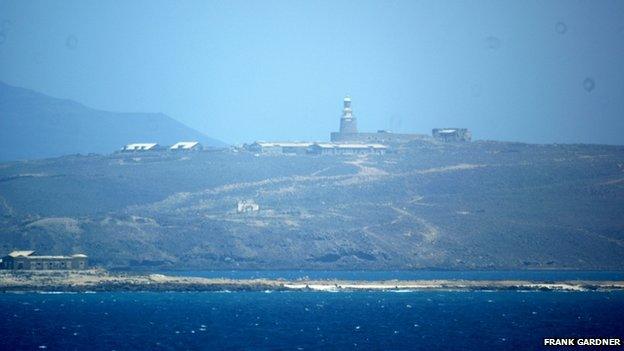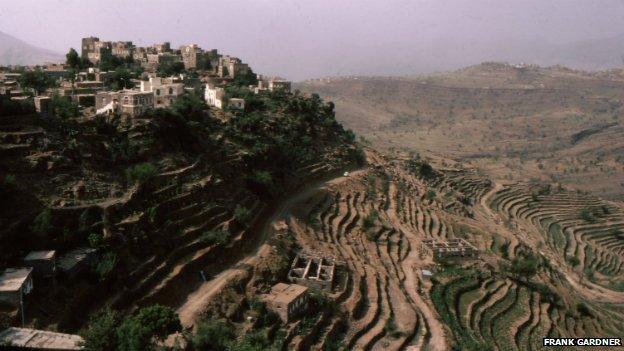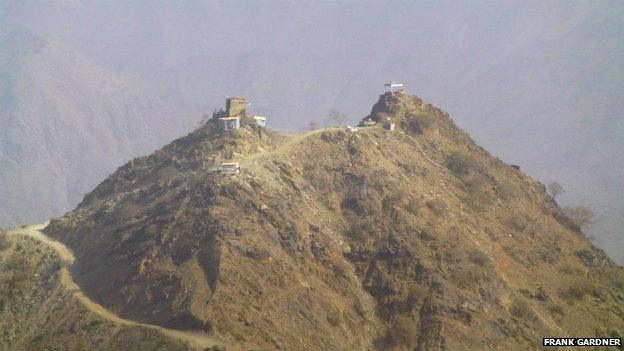Yemen crisis: Chaos is security nightmare for US
- Published

Yemen's counter-terrorism forces have been trained by US Special Forces for several years
Yemen is in turmoil.
Both its president and government are reported to have resigned amid a stand-off with Shia rebels, the Houthis, who have taken control of the capital.
The army has all but melted away but the Sunni tribes, encouraged by al-Qaeda, are busy mobilising to confront the Houthis as they push east.
The entire framework for one of Washington's most important security partners in a dangerous region is now in serious danger of falling apart.

Yemen sits on the strategically vital Bab El Mandeb Strait
Why does Yemen matter to Washington and the West? After all, this is not Kuwait. Yemen is not a rich country, in fact it is the poorest in the Arab world. Its dwindling oil exports are expected to run out altogether before 2020.
But Yemen sits at the extreme south-west of the Arabian Peninsula, right on the strategic Bab El Mandeb Strait, separating the Middle East from Africa, where an estimated 20,000 ships pass annually through the strategic bottleneck between the Indian Ocean and the Red Sea and beyond, the Suez Canal.
Yemen's second city, Aden, was once a major bunkering port for ships making the long passage from Europe to India. Today, sadly, that city is a sleepy backwater where flamingos feed on deserted mudflats as most vessels steam past, giving it a wide berth.
The US Navy in particular has avoided it since 2000 when al-Qaeda suicide bombers rammed a boat full of explosives into a billion-dollar destroyer, the USS Cole, killing 17 sailors.

Yemen is the poorest country in the Arab world and its energy reserves are dwindling
For most Yemenis, their daily preoccupation is simply how to get by in a crumbling economy beset with corruption. Many rely on remittances sent from relatives working in the Gulf.
But for Washington there is a different preoccupation: Yemen is home to what Western intelligence analysts consider to be the most dangerous franchise of al-Qaeda. AQAP stands for al-Qaeda in the Arabian Peninsula, an alliance formed in 2009 between violent Yemeni and Saudi Islamists.
International reach
AQAP's local focus is on seizing and holding tribal territory in the under-governed spaces of Marib, al-Bayda and Shabwa provinces.
Periodically it sends suicide bombers into the capital, Sanaa, to kill dozens of policemen and other security officials. It has also carried out the abduction and assassination of intelligence officials, sometimes using assassins on motorbikes.
But AQAP continues to grab the attention of the CIA and the Pentagon's JSOC (Joint Special Operations Command) because of its international reach.
Earlier this month it claimed to be behind the attack on the offices of satirical magazine Charlie Hebdo in Paris, although it has yet to offer any substantive proof.

Security has declined markedly on the Yemeni side of its border with Saudi Arabia
But three times now AQAP has successfully smuggled viable bombs onboard aircraft on international flights. The first exploded in or on an al-Qaeda operative in Saudi Arabia in 2009, narrowly missing the Saudi counter-terrorism chief.
The next got as far as Detroit where the so-called "underpants bomber" tried unsuccessfully to light a device concealed in his underwear as the plane descended to land.
And then in 2010, AQAP smuggled bombs hidden in printer ink toner cartridges on US-bound cargo planes that got as far as East Midlands Airport and Dubai before an intelligence tipoff alerted the authorities.
The group has vowed to keep trying and it is believed they have shared their bomb making expertise with cells in northern Syria.
Covert operations
Washington has spent more than a decade helping the Yemeni government build up its counter-terrorism capabilities.
US Special Forces have been discreetly training the Yemenis at a base outside the capital, while the US, Saudi Arabia and Yemen all co-operate on conducting airstrikes by unmanned Reaper drones on suspected militants in remote areas.
The drone strikes are highly controversial and have killed dozens of civilians over the years, according to local tribes. In 2011, one killed a US citizen - AQAP's Anwar Al-Awlaki.
But the current political and security upheaval in Yemen means that a question mark now hangs over who Washington should partner with and for how long its security cooperation can last in this troubled country.
The nightmare scenario, both for Washington, its Gulf Arab allies, and for Yemen, is that the country erupts into a civil war pitting the Shia Houthis - suspected of being backed by Iran - against Sunni tribes backed by al-Qaeda.
Little wonder that the US Navy now has two amphibious warships poised offshore to evacuate its nationals if the situation continues to deteriorate.